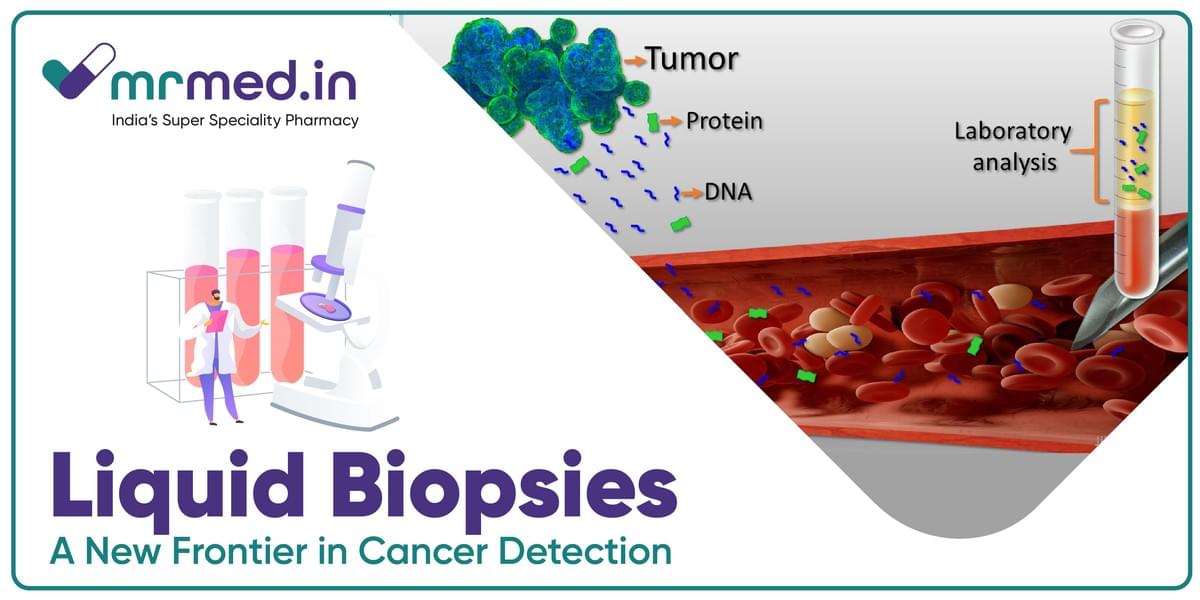Imagine if detecting cancer could be as easy as a routine blood test. This vision is coming to life with the revolutionary development of liquid biopsies. Unlike traditional methods that require invasive tissue samples, liquid biopsies analyse biomarkers in bodily fluids to uncover the presence of cancer.
This breakthrough offers a less cpmplex, more convenient way to diagnose and track the disease, marking a crucial leap forward in how we manage cancer care and potentially transforming countless lives in the process.

Liquid biopsies are a cutting-edge diagnostic tool that involves testing blood, urine, or other fluids to identify cancer-related biomarkers such as circulating tumour DNA (ctDNA), circulating tumour cells (CTCs), or exosomes. These biomarkers can offer essential insights into the detection and progression of cancer, potentially allowing for earlier detection compared to conventional methods.
What is the mechanism of liquid biopsy?
Traditional biopsy methods involve extracting tissue from a tumour, which can be invasive and often requires complex surgical procedures. Liquid biopsies, on the other hand, offer a more accessible approach.
By analysing a simple blood sample, healthcare providers can gather vital information about the tumour's genetic and molecular profile. This noninvasive approach not only reduces patient discomfort but also opens up possibilities for more frequent monitoring.
What are the advantages of liquid biopsy over traditional biopsy?
- Minimally Invasive: Liquid biopsies do not require surgical procedures, making them a less physically taxing option for patients.
- Early Detection: They can detect cancer earlier than conventional methods, potentially leading to better outcomes.
- Real-Time Monitoring: Liquid biopsies can provide insights into how well a treatment is working or whether the cancer is evolving by tracking changes in biomarkers over time.
- Comprehensive Insights: They can identify mutations and genetic changes that are critical for personalising treatment plans.
What is the application of liquid biopsy?
Liquid biopsies are increasingly being integrated into various aspects of cancer care:
Early Detection and Diagnosis
One of the most significant benefits of liquid biopsies is their potential for early cancer detection. By analysing biomarkers in the blood, doctors can identify cancer before symptoms arise, which can be crucial for cancers that are difficult to detect at early stages, such as pancreatic or ovarian cancer.
Monitoring Treatment Response
Liquid biopsies can monitor how well a patient is responding to treatment. For instance, changes in the levels of ctDNA can indicate whether a treatment is effectively targeting the tumour or if the cancer is becoming resistant. This allows for more personalised and adaptive treatment strategies.
Detecting Recurrence
Post-treatment liquid biopsies offer a non-invasive way to detect any signs of cancer recurrence. This can be particularly useful for cancers with a high likelihood of coming back, providing an early warning that can prompt timely interventions.
How is liquid biopsy revolutionising the field of cancer precision medicine?
Personalised medicine aims to tailor treatment based on the individual characteristics of each patient’s cancer. Liquid biopsies play a crucial role in this approach by providing detailed information about the cancer's genetic makeup. This data helps oncologists select targeted therapies that are most likely to be effective for the specific mutations present in the tumour.
What are the current limitations and challenges of liquid biopsy?
While the potential of liquid biopsies is enormous, there are several challenges and limitations to consider:
- Sensitivity and Specificity: It is crucial for liquid biopsies' success to ensure that they are both highly sensitive (detecting all true positives) and specific (avoiding false positives).
- Standardisation: Standardized procedures and guidelines are needed to ensure consistency in results across different laboratories and clinical settings.
- Cost and Accessibility: As with many advanced technologies, the cost of liquid biopsies can be a barrier to widespread adoption, particularly in lower-resource settings.
Integrating Liquid Biopsies with Existing Treatments and Technologies
Liquid biopsies represent a significant advancement in cancer diagnostics, complementing traditional methods and offering a more holistic approach to cancer care. Here’s how they fit into a broader treatment strategy:
- Holistic Approach: Liquid biopsies work alongside imaging techniques and tissue biopsies, providing a comprehensive understanding of a patient's condition.
- Incorporating Cancer Treatments: Combining liquid biopsies with the latest cancer treatments and supportive care options is crucial for effective management. For instance, the choice of appropriate cancer medications, such as Tagrisso 40mg Tablet—a targeted therapy for non-small cell lung cancer and the best protein drink for cancer patients—ensures a well-rounded approach to care.
- Knowledge of treatment options: For patients receiving treatment, utilising additional resources like a cancer medicine app to track their treatments and manage side effects can be incredibly beneficial.
Moreover, consulting a cancer library for educational materials and support, alongside exploring a Cancer Care Solution for comprehensive care plans, can enhance the overall treatment experience.
The Future of Liquid Biopsies
The field of liquid biopsies is evolving rapidly, with ongoing research focused on improving accuracy, expanding the range of detectable cancers, and reducing costs. As these advancements continue, liquid biopsies are poised to become an integral part of routine cancer care.
In the future, the integration of liquid biopsies with personalised treatment approaches will likely enhance cancer patients' outcomes and quality of life.
Wrapping up
Liquid biopsies represent a significant leap forward in cancer detection, offering a less invasive, more accessible alternative to traditional biopsy methods. Their ability to provide early detection, monitor treatment response, and detect recurrence makes them a valuable tool in modern oncology. As technology progresses, it promises to revolutionise cancer care, setting the stage for more effective and personalised treatment options.
